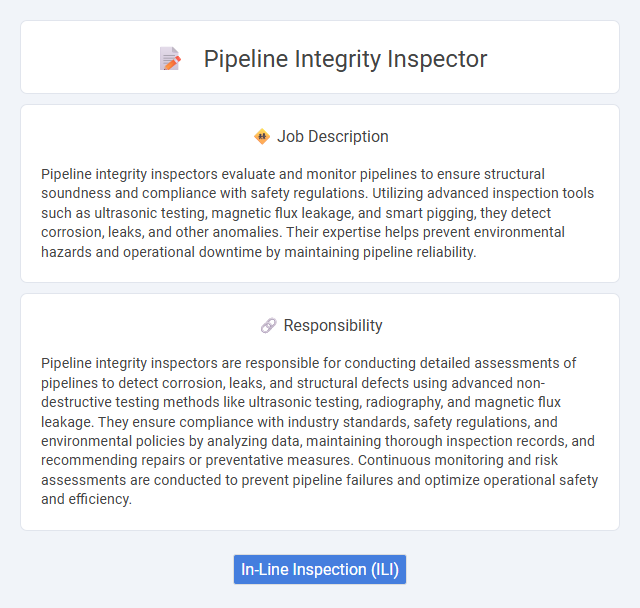
Pipeline integrity inspectors evaluate and monitor pipelines to ensure structural soundness and compliance with safety regulations. Utilizing advanced inspection tools such as ultrasonic testing, magnetic flux leakage, and smart pigging, they detect corrosion, leaks, and other anomalies. Their expertise helps prevent environmental hazards and operational downtime by maintaining pipeline reliability.
Individuals with strong attention to detail and physical stamina are likely suitable for a pipeline integrity inspector role, as the job often requires thorough visual inspections and working in various environments. Those with a proactive mindset and problem-solving skills may better identify potential issues and ensure pipeline safety. However, candidates with limited physical fitness or difficulty focusing on technical tasks might find this position challenging.
Qualification
Pipeline integrity inspector positions typically require a technical background in engineering, construction, or a related field, often supported by certifications such as NACE CIP Levels or API 1169. Proven experience in non-destructive testing (NDT) methods and knowledge of pipeline materials, welding standards, and corrosion control practices are essential qualifications. Strong analytical skills and familiarity with industry regulations and safety protocols enhance a candidate's suitability for ensuring the structural health and compliance of pipeline systems.
Responsibility
Pipeline integrity inspectors are responsible for conducting detailed assessments of pipelines to detect corrosion, leaks, and structural defects using advanced non-destructive testing methods like ultrasonic testing, radiography, and magnetic flux leakage. They ensure compliance with industry standards, safety regulations, and environmental policies by analyzing data, maintaining thorough inspection records, and recommending repairs or preventative measures. Continuous monitoring and risk assessments are conducted to prevent pipeline failures and optimize operational safety and efficiency.
Benefit
Pipeline integrity inspector roles likely offer significant benefits such as competitive salaries and opportunities for career advancement within the energy sector. The position may provide extensive on-the-job training and certification opportunities, enhancing professional skills and industry knowledge. Health and safety benefits are probably robust, reflecting the demanding nature of the pipeline maintenance and inspection environment.
Challenge
Pipeline integrity inspectors likely face the challenge of accurately detecting and assessing defects within vast and often inaccessible pipeline networks. The probability of encountering complex corrosion, material fatigue, or weld anomalies requires advanced inspection technologies and specialized skills. Maintaining safety standards while minimizing operational disruptions can also present ongoing difficulties in this role.
Career Advancement
Pipeline integrity inspectors ensure the safety and reliability of pipeline systems by conducting regular assessments and implementing maintenance protocols. Expertise in nondestructive testing methods and regulatory compliance significantly enhances career advancement opportunities within the oil and gas and energy sectors. Pursuing certifications such as API 1169 and gaining experience in pipeline risk management can lead to senior positions and specialized roles in project management or engineering.
Key Terms
In-Line Inspection (ILI)
Pipeline integrity inspectors specializing in In-Line Inspection (ILI) utilize advanced diagnostic tools such as smart pigs to detect anomalies like corrosion, cracks, and mechanical damage within pipelines. They analyze data from ultrasonic, magnetic flux leakage, and geometry inspection tools to assess pipeline condition, ensuring compliance with safety regulations and preventing potential leaks or failures. Their expertise supports proactive maintenance planning and extends the operational lifespan of critical pipeline infrastructure.
 kuljobs.com
kuljobs.com